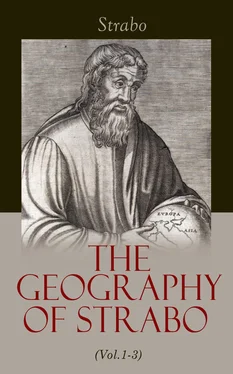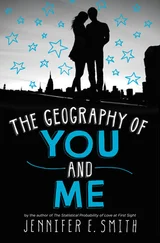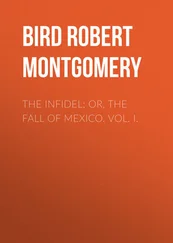14. Toulouse is situated upon the narrowest part of the isthmus which separates the ocean from the sea of Narbonne; the breadth of the [isthmus], according to Posidonius, being less than 3000 stadia. The perfect similarity maintained throughout this country both in respect to its rivers, and to the exterior and interior sea, 1401appears to us worthy of especial notice, as we have said before. This, on reflection, will prove to be one main cause of the excellence of this country, since the inhabitants are enabled mutually to communicate, and to procure from each other the necessaries of life; this is peculiarly the case at the present time, when on account of their leisure from war they are devoting themselves to agriculture and the pursuits of social life. In this we are persuaded that we behold the work of Providence; such a disposition of these regions not resulting from chance, but from the thought of some [intelligence]. The Rhone, for instance, is navigable to a considerable distance for vessels of heavy burden, which it is capable of transmitting through various districts of the country by means of other rivers which fall into it, and are likewise fitted for the navigation of large vessels. To the Rhone succeeds the Saone, 1402and into this latter river falls the Doubs; thence the merchandise is carried by land to the river Seine; whence it is transported to the ocean and the [countries of the] Lexovii and Caleti, 1403the distance thence to Britain being less than a day’s journey. The navigation of the Rhone being difficult on account of the rapidity of its current, the merchants prefer to transport in waggons certain of their wares, which are destined for the Arverni, 1404and the river Loire, 1405notwithstanding the vicinity of the Rhone in some places, but the road being level and the distance not far, (about 800 stadia,) they do not make use of water carriage on account of the [Pg 282] [CAS. 189] facility of the transport by land, from thence the merchandise is easily conveyed by the Loire. This river flows from the Cevennes into the ocean. From Narbonne the voyage to the Aude 1406is short, but the journey by land to the river Garonne longer, being as much as 700 or 800 stadia. The Garonne likewise flows into the ocean. Such is what we have to say concerning the inhabitants of the Narbonnaise, who were formerly named Kelts. In my opinion the celebrity of the Kelts induced the Grecians to confer that name on the whole of the Galatæ; the vicinity of the Massilians may also have had something to do with it. 1407
Table of Contents
1. We must now speak of the Aquitani and the fourteen Galatic nations pertaining to them, situated between the Garonne and the Loire, some of which extend to the river Rhone and the plains of the Narbonnaise. Generally speaking, the Aquitani may be said to differ from the Galatic race, both as to form of body and language, resembling more nearly the Iberians. They are bounded by the Garonne, and dwell between this river and the Pyrenees. There are above twenty nations which bear the name of Aquitani, small and obscure, the major part of them dwelling by the ocean, and the remainder in the interior and by the extremities of the Cevennes, as far as the Tectosages. This district, however, being too small, they added to it the territory between the Garonne and the Loire. These rivers are nearly parallel with the Pyrenees, and form with them two parallelograms, bounded on the remaining sides by the ocean and the mountains of the Cevennes. 1408Both of these rivers are navigable for a distance of about 2000 stadia. 1409The Garonne, after being augmented by three other rivers, 1410discharges itself into the [ocean] between the [country] of the Bituriges, surnamed the Vivisci, 1411and that of the Santoni; 1412both of them Gallic nations.
The Bituriges are the only foreign people who dwell among the Aquitani without forming a part of them. Their emporium is Burdegala, 1413situated on a creek formed by the outlets of the river. The Loire discharges itself between the Pictones and the Namnetæ. 1414Formerly there was an emporium on this river named Corbilon, mentioned by Polybius when speaking of the fictions of Pytheas. “The Marseillese, [says he,] when interrogated by Scipio 1415at their meeting, had nothing to tell about Britain worth mentioning, nor yet had the people of the Narbonnaise, nor those of Corbilon; notwithstanding these were the two principal cities of the district, Pytheas alone dared to forge so many lies [concerning that island].” Mediolanium 1416is the capital of the Santoni. The part of Aquitaine next the ocean is for the most part sandy and meagre, producing millet, but barren of all other fruits. Here is the gulf which, with that on the coast of Narbonne, forms the isthmus. Both these gulfs 1417go by the name of the Galatic gulf. The former gulf belongs to the Tarbelli. 1418These people possess the richest gold mines; masses of gold as big as the fist can contain, and requiring hardly any purifying, [Pg 284] [CAS. 190] being found in diggings scarcely beneath the surface of the earth, the remainder consisting of dust and lumps, which likewise require but little working. In the interior and mountainous parts [of Aquitaine] the soil is superior; for instance, in the district near the Pyrenees belonging to the Convenæ, 1419which name signifies people assembled from different countries to dwell in one place. Here is the city of Lugdunum, 1420and the hot springs of the Onesii, 1421which are most excellent for drinking. The country of the Auscii 1422likewise is fine.
2. The nations between the Garonne and the Loire annexed to the Aquitani, are the Elui, 1423who commence at the Rhone. After these the Vellæi, 1424who were formerly comprehended amongst the Arverni, 1425but now form a people to themselves. After these Arverni come the Lemovices, 1426and Petrocorii, 1427and after them the Nitiobriges,(1428) the Cadurci,(1428) and the Bituriges,(1428) surnamed Cubi. Along the ocean we meet with the Santoni, and Pictones, 1428the former dwelling by the Garonne, as we have stated, and the latter by the Loire. The Ruteni and the Gabales 1429are in the vicinity of the Narbonnaise. The Petrocorii and Bituriges-Cubi possess excellent iron-works, the Cadurci linen-factories, and the Ruteni silver-mines: the Gabales likewise possess silver-mines. On certain amongst the Aquitani the Romans have conferred the rights of Latin cities; such for instance as the Auscii, and the Convenæ.
3. The Arverni are situated along the Loire. Nemossus, their metropolis, is built on the same river. 1430This river having flowed past Genabum, 1431an emporium of the Carnutes, 1432situated about the middle of its course, discharges itself into the ocean. A great proof of the former power of the Arverni, is the fact of the frequent wars which they sustained against the Romans, sometimes with armies of 200,000 men, and sometimes with double that number, which was the amount of their force when they fought against divus Cæsar under the command of Vercingetorix. 1433Before this they had brought 200,000 men against Maximus Æmilianus, and the same number against Domitius Ænobarbus. Their battles with Cæsar took place, one in Gergovia, 1434a city of the Arverni situated on a lofty mountain, the birth-place of Vercingetorix; the other, near to Alesia, 1435a city of the Mandubii, who border on the Arverni; this city is likewise situated on a high hill, surrounded by mountains, and between two rivers. Here the war was terminated by the capture of their leader. The battle with Maximus Æmilianus was fought near the confluence of the Isère and the Rhone, at the point where the mountains of the Cevennes approach the latter river. That with Domitius was fought lower down at the confluence of the Sulgas 1436and the Rhone. The Arverni extended their dominion as far as Narbonne and the borders of Marseilles, and exercised authority over the nations as far as the Pyrenees, the ocean, and the Rhine. Luerius, 1437the father of Bituitus who fought against Maximus and Domitius, is said to have been so distinguished by his riches and luxury, that to give a proof of his opulence to his friends, he caused himself to be dragged across a plain in a car, whilst he scattered gold and silver coin in every direction for those who followed him to gather up.
Читать дальше












![Anne Blunt - A Pilgrimage to Nejd, the Cradle of the Arab Race. Vol. 2 [of 2]](/books/750183/anne-blunt-a-pilgrimage-to-nejd-the-cradle-of-the-thumb.webp)